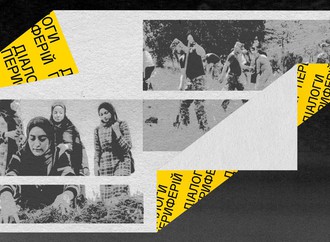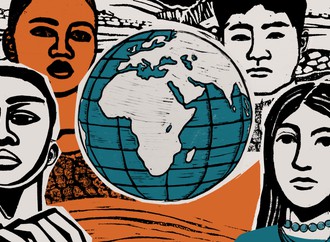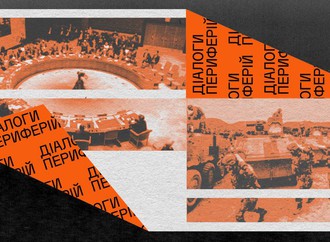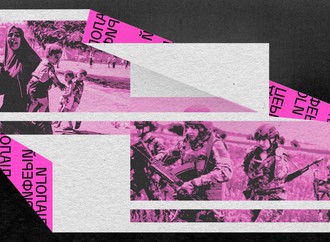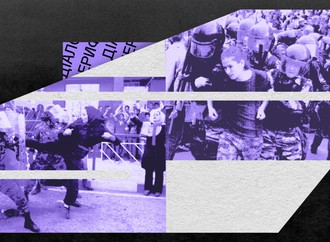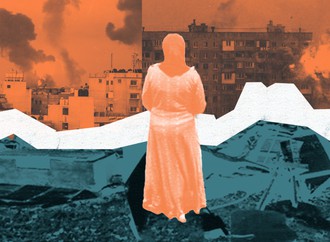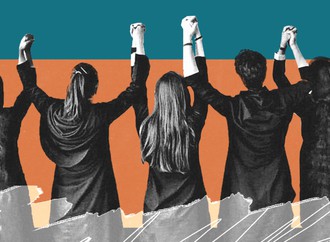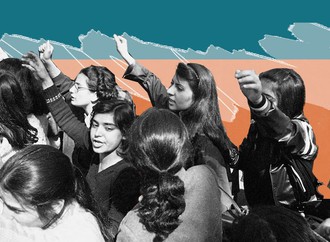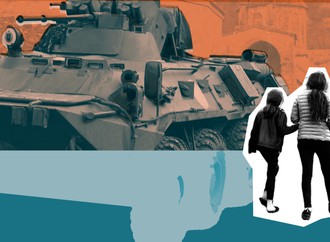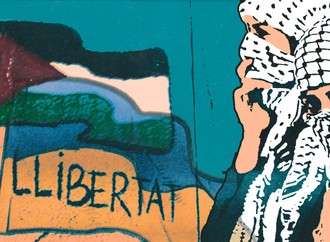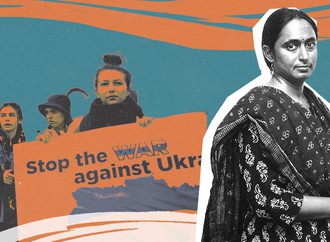What should new global security guarantees look like? How to counter global inequality? What should be the basis of international solidarity?
These questions are relevant not exclusively in the context of Russian aggression and the reconstruction of Ukraine, but are crucial for many other countries with a history of colonial oppression, too. Therefore, the answer to these questions should be sought in a joint dialogue on ways of anti-imperialist struggle and the vision of alternative development in the future.
This spring, our editorial board initiated a special Dialogues of the Peripheries project to start such a discussion. Since then, we have published the voices of many activists from different regions, from Latin America to East Asia. Now we invite everyone to the joint discussion during the annual Feuerbach 11 conference.
The conference will take place online on November 4-5 featuring 6 thematic sections.
More about the events within the conference:
Eating in crisis: food sovereignty, war and environment
November 4th, 12:00 (Kyiv time)
Russia’s war against Ukraine causes the destruction of lives, human and non-human, and the devastation of entire environments. The situation was already challenging before the war, with the land policy favouring large agricultural holdings over small-holders’ or ecological needs. The war intensified these issues, polluting vast areas of Ukrainian land and water with heavy metals and making it impossible to grow food for generations. Its ripple effects are felt across the countries dependent on Ukrainian production. Climate change exacerbates the problem, putting Ukraine at severe risk of droughts and loss of quality soil. This panel examines the destruction through the lens of food sovereignty and explores pathways towards a healthier, just, and decolonial food system.
Speakers:
-
Natalia Mamonova, senior researcher at RURALIS - Institute for Rural and Regional Research, Norway/Ukraine.
-
Serge Harfouch, farmer and activist, founder of the Buzuruna Juzuruna farmer school in Lebanon.
-
Andrew Bennie, senior researcher in food systems and climate policy at the Institute for Economic Justice, South Africa.
-
Fuad Abu Saif, human rights defender, developer of agricultural initiatives and programs, general director at the Union Of Agricultural Work Committees (UAWC), Palestine.
The discussion will be moderated by researcher and artist Iryna Zamuruieva.
International (in)security: building solidarity in a rupturing world?
November 4th, 15:00 (Kyiv time)
Russia's invasion of Ukraine exposed a deepening crisis of international security. Variously described as the decline of the American hegemony, the dawning of a multi-polar, or the intensification of inter-imperialist rivalry, this tendency leads to threats of or outbreaks of fighting from Mali to Taiwan, from Armenia to Palestine. It is felt most acutely in peripheral areas, where populations have been historically subject to imperial ambitions of imperialist countries. International organizations or coalitions struggle to prevent conflicts or achieve their peaceful resolution. Progressive movements, on their part, often lack a vision of a just international order and avoid the question of security. In addition, the situation is complicated by the fact that oppressed peoples rely on the help of various competing imperialist states, which provokes camp/block thinking and makes international solidarity difficult.
Speakers:
-
Dana El Kurd, Palestine.
-
Chelsea Ngoc Minh Nguyen, Vietnam-Indonesia.
-
Brian Hioe, Taiwan.
-
Christina Soloyan, Armenia.
-
Volodymyr Artiukh, Ukraine.
The panel will be moderated by historian and activist Hanna Perekhoda. Organiser — Taras Bilous.
Women during the war: between defense of the country and lack of social security
November 4th, 18:00 (Kyiv time)
War creates new challenges for women, such as displacement, unemployment or necessity to defend your community. And deepens the old ones — the burden of reproductive labour and sexualised violence. In the war, women and girls take on multiple roles: they can be victims, soldiers, activists, refugees. In countries at war and beyond — we suffer and fight increasing injustice on so many levels. This panel focuses on relationships between womanhood and war — from everyday lives to structural and historical processes.
Speakers:
-
Marta Havryshko, Ukraine.
-
Weronika Grzebalska, Poland.
-
Anwar Mhajne, Palestine.
The panel will be moderated by sociologist and editor of Commons Journal Olenka Gu.
Labour rights in conditions of war and mass migration: how to work under attack?
November 5th, 12:00 (Kyiv time)
When a country defends itself from military aggression it is not easy to fight for social guarantees, just economy or decent labor rights. Moreover, the most mobile social groups, especially youth, "vote" against the government policy by leaving the country. This happened in four countries, the population of which massively work abroad - Ukraine, Armenia, Georgia and Moldova. All these countries experienced neoliberal destruction. In some the war became the justification of the anti-social policy of privatization and cuts of social sector; in others - weakness of civil society and trade unions. Some of these countries already went through post-war transformation of the labor market, others just hope for post-war reconstruction.
On this panel together with activists from four countries we will discuss how and why we need to fight for labor rights even during the war. The discussion will be moderated by trade union activist Artem Tidva.
Speakers:
-
Raisa Liparteliani, Georgian Trade Union Confederation.
-
Anahit Asatryan, State Servants Union of Armenia.
-
Anton Ivchenko, Helsinki Citizens’ Assembly-Vanadzor, Armenia.
-
Vasyl Andreyev, Federation of Trade Unions of Ukraine, Construction Workers Union.
-
Lilia Nenescu, Clean Clothes Campaign, PLATFORMA, Moldova.
How does the international refugee system have to work?
November 5th, 15:00 (Kyiv time)
Ukrainian displaced people often were welcomed more enthusiastically than migrants from other countries. But does this mean that their journeys and integration in the European (and other) societies is hurdle-free? Does it make sense to oppose the experiences of Ukrainians and refugees from other countries? Or on the contrary, the international system of welcoming and accommodating displaced people must be radically changed?
We will look for answers to these questions on the fifth panel of our conference, which will be moderated by sociologist and editor of Commons Journal Anastasia Riabchuk.
Speakers:
-
Ayşe Çağlar, Social and Cultural Anthropologist, Vienna University.
-
Ruslana Koziienko, social anthropologist, Central European University, Vienna.
-
Volha Biziukova is a political and social anthropologist, Brown University.
-
Elizabeth Cullen Dunn, geographer, Indiana University Bloomington.
-
Eiman Seifeldin, member of the Sudanese Environmentalists Association
When will they fall? Authoritarian regimes and imperialist aggression
November 5th, 18:00 (Kyiv time)
The key precondition of the Russian invasion of Ukraine is the authoritarian regime which had been fascisising and consolidating in the hands of Putin throughout the years. After the oppression of nations living on territory of Russia, destruction of opposition initiatives, violent intervention in suppression of revolution in Syria and many other oppressive and imperialist actions, ignored by the West, the Russian regime attempted to occupy Ukraine. However such tendencies are present not only in Russia.
On this panel we would like to analyze the uprise and development of authoritarian regimes and perspective of opposition to them. It will be moderated by sociologist and editor of Commons Journal Alona Liasheva.
Speakers:
-
Ilya Budraitskis, political and cultural theorist and activist, visiting scholar at UC Berkeley, Russia.
-
Frieda Afary, Iranian American socialist feminist activist, translator and writer.
-
Csaba Vincze, journalist, Hungary.
***
All panel discussions will happen online and be broadcasted in Zoom rooms, on our Facebook page, and on our YouTube channel.
Those who pre-register for the event will have an access to simultaneous interpretation into Ukrainian and English.
Registration links and details for each panel will be posted on Facebook Events.
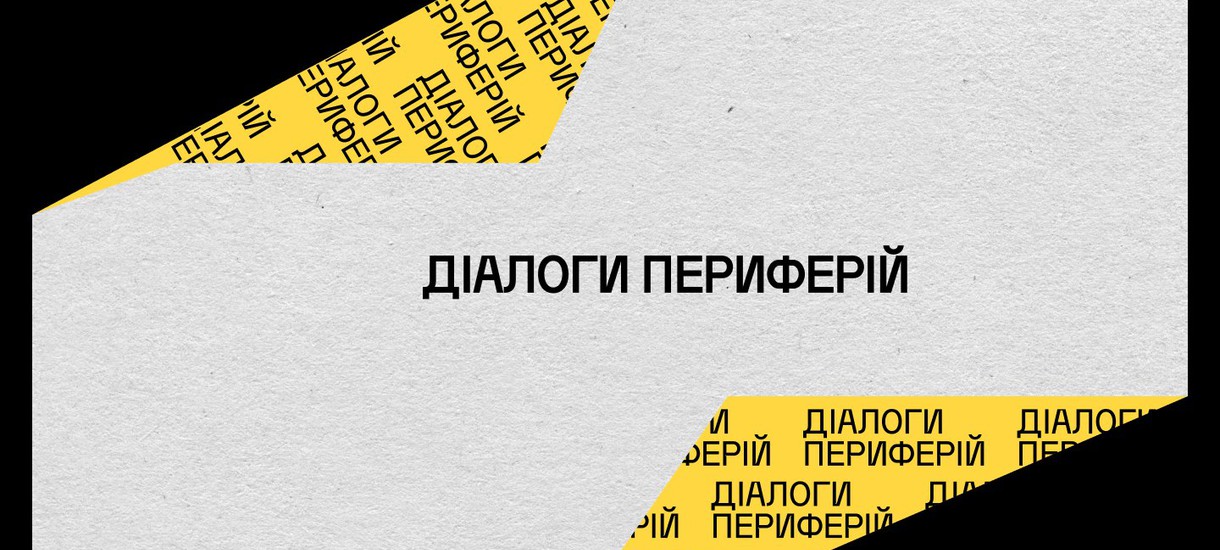

-1_category.png)
